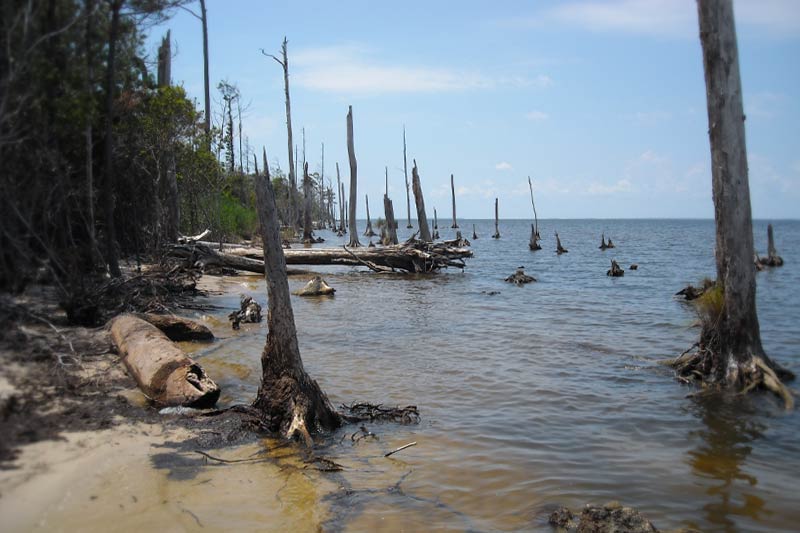Lecture Addresses Climate Change Impact on NC Coastal Forests
- By Gaye Hill
- Published

On Thursday, October 27, two experts spoke at Meredith about the devastating impacts of climate change on coastal forests in North Carolina.

In a lecture titled “Ghost Forests: Symbols of Climate Change and Resilience,” Marcelo Ardón, associate professor for the Department of Forestry and Environmental Resources at NC State University, and Melinda Martinez, a Mendenhall Post-Doctorate/Research Ecologist with the United States Geological Survey Wetland and Aquatic Research Center, described how they have scientifically documented the spread of this phenomenon in North Carolina, how our coastal ecosystems are adapting to this change, and how we can help to slow climate change.

“Climate change is happening now and in your state,” she said.
Martinez also shared photos of her research, including some from the Florida Everglades where she used airboats and helicopters to access remote locations.
Ardón focused on his work in the marshes of Pamlico Sound, N.C., where he studied ghost forests. He contrasted the North Carolina marshes’ poor performance in sequestering carbon with similar areas in Georgia, where marshes are more effective than forests at sequestering carbon. He noted that ditches and drains that have been used to facilitate agricultural efforts in the N.C. wetlands are good at bringing salinity into the marsh.
“The answer to whether ghost forests are a good thing or bad thing might depend on where you are in the landscape,” he said.
Although the effects of climate change are dire in this region, positive efforts are being made to address areas that are capable of restoration. Ardón also noted a citizen science project called Sentinels of the Sounds, which invites visitors to take photos and help document ecosystem change.
He concluded his portion of the lecture by crediting his wife, Dr. Erin Lindquist, with bringing him to North Carolina and inspiring him to study trees. Lindquist was a faculty member at Meredith College from 2006-19.
“I loved trees before I met Erin, but she really loved trees. She was a professional tree hugger,” he said.
He drew parallels between the resilience of the trees he studies and Lindquist’s fortitude as she battled cancer for seven years before passing away in 2019. He said he is happy to see that her work continues to have an impact at Meredith, citing, in particular, the Costa Rica study abroad course that Lindquist started many years ago.
Saying that although it is difficult, he feels it is his duty to keep telling her story, Ardón offered some “unsolicited advice” on her behalf, telling the students “be optimistic, be kind, be persistent, and have fun.”
When a student asked how they can help, he encouraged them to talk about the situation.
“If you see them when you go out to the coast, point them out. You can help raise awareness.”
The lecture was a component of Meredith’s 2022 Summer Reading Program (SRP), which is focused on climate change. It was sponsored by SRP and Angels for the Environment, a student organization that works to increase awareness of environmental issues, engage Meredith students in sustainable projects, and provide opportunities for students to appreciate the earth.
This lecture was presented in memory of Dr. Erin Lindquist. An award-winning and inspiring professor, Lindquist taught biology and environmental sustainability courses at Meredith from 2006-19. At Meredith, she coordinated the Environmental Sustainability major and minor, facilitated significant grants, and directed numerous undergraduate research projects.
News Director
316 Johnson Hall
(919) 760-8087
Fax: (919) 760-8330
PRINCETON REVIEW
U.S. NEWS
NICHE
3800 Hillsborough Street Raleigh, NC 27607-5298 | (919) 760-8600 Fax: (919) 760-8330 | © 2024 All Rights Reserved.